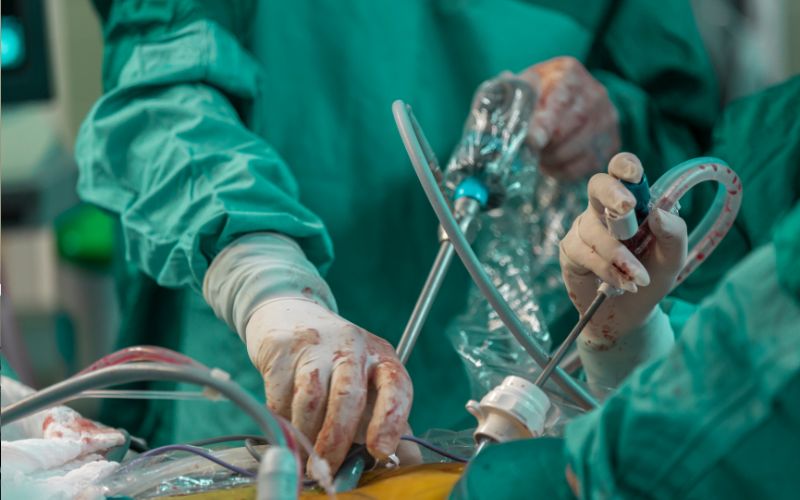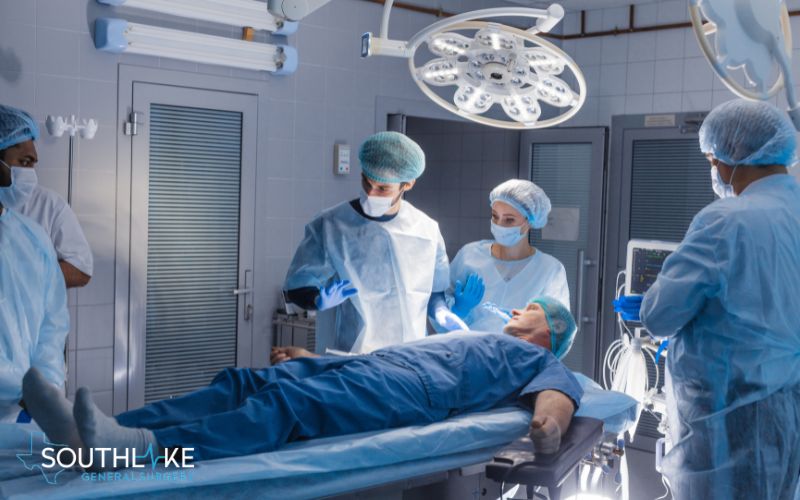Choosing the best hernia repair surgeon is like picking a key that opens the door to a life free from the discomfort and inconvenience of hernias. It’s about entrusting your health to a professional who has the experience, skills, and compassion to ensure a safe and successful hernia repair.
This journey to recovery begins with understanding hernias, selecting the right hernia surgeons, understanding the different surgical approaches, preparing for surgery, managing recovery, and mitigating the risk of complications and recurrence. So, let’s embark on this journey with a sense of confidence and empowerment.
Key Takeaways
- Understand hernia types and treatments for a successful repair.
- Consider surgeon experience, qualifications, credentials, and patient reviews to select the right one.
- Follow pre-operative instructions and post-care advice to reduce the complications and recurrence risks of hernia surgery.
Understanding Hernia Surgery

Hernias are characterized by a weakness in the abdominal wall, leading to the protrusion of internal tissue into an abnormal location. Hernias are not amenable to treatment through medication, usually requiring surgical intervention by abdominal hernia surgeons.
As a patient, understanding the types of hernias and their surgical treatments, including abdominal wall reconstruction and tissue reconstruction, is the first step toward a successful hernia repair.
We begin our exploration of hernias by examining the most common types: inguinal, umbilical, and hiatal hernias.
Inguinal Hernia
An inguinal hernia, the most common type of hernia, is characterized by the following:
- Protrusion of abdominal tissue through the lower abdominal wall in the vicinity of the groin
- It may appear as a noticeable lump in the groin area
- It may cause discomfort or even pain
- In some instances, inguinal hernias may be linked to gastric bypass surgery, which increases the risk of developing a hernia, including a complex hernia.
A general surgeon will perform a thorough examination of the patient’s medical history and physical findings to diagnose whether this condition will require surgery. Following laparoscopic hernia surgery, patients can typically return to their usual activities within a month.
Umbilical Hernia
Umbilical hernias, on the other hand, are protrusions near the belly button. While these are more common in children, they also occur in adults and can cause discomfort or interfere with daily activities, necessitating surgical treatment.
The symptoms of an umbilical hernia include a noticeable protrusion near the navel, particularly during exertion or distress. The likelihood of developing an umbilical hernia can increase due to multiple pregnancies, being overweight, or straining. These factors contribute to the higher risk of developing this condition.
Hiatal Hernia
A hiatal hernia is a condition where the stomach and other abdominal organs protrude through the diaphragm into the chest or abdomen area. Persistent heartburn, acid reflux, and severe bloating are some of the symptoms that might necessitate laparoscopic hernia surgery.
Following hiatal hernia surgery, patients usually spend a night in the hospital and can expect to fully recover and resume normal activities within a month.
Selecting the Right Hernia Surgeon

Having dissected the types of hernias and their treatment, it is time to shift focus towards locating the appropriate hernia surgeon. Just as you would pick a key to open a door, choosing the right surgeon opens the door to a successful hernia repair.
An experienced specialist for hernia surgery with a proven track record in reconstructive surgery can significantly reduce the risk of complications, such as the recurrence of hernias.
Evaluating Experience and Expertise
The expertise of a hernia surgeon is paramount in ensuring a successful surgical outcome. A surgeon’s experience is reflected in their track record as surgeons, the outcomes of new patients, and their past surgeries. Surgeons with more years of experience under their belt typically have higher success rates, enhanced decision-making skills, and improved complication management skills.
Thus, taking into account the surgeon’s experience, the number and type of hernia surgeries performed, and success rates should be an integral part of your decision-making process.
Reviewing Qualifications and Credentials
When choosing a general surgeon for hernia repair, it’s crucial to look into their qualifications and credentials. Let’s take a moment to review those of Dr. Valeria Simone MD, a highly regarded professional in the field.
Dr. Simone is a board-certified general surgeon specializing in hernia repair surgery. She earned her medical degree from a renowned university and completed her residency at a prestigious medical center. Over the years, she has gained extensive experience in treating a wide range of hernias, from the common inguinal hernia to more complex cases, using various surgical approaches.
Dr. Simone is a member of several professional medical associations, which not only attests to her professional standing but also ensures she stays updated with the latest developments in hernia repair. She has also been recognized for her clinical excellence and high-quality patient care.
Moreover, Dr. Simone is known for her empathetic approach to patient care. She takes the time to explain the surgical process in detail, ensuring her patients fully understand their condition and the proposed treatment plan. This patient-centered approach has earned her many positive reviews from her patients.
In conclusion, Dr. Valeria Simone MD’s qualifications and credentials make her an excellent choice for those seeking a skilled and compassionate general surgeon for hernia repair.
The Surgical Approaches to Hernia Repair Surgery
Determining the appropriate surgical approach for your hernia repair is equally significant as choosing the right hernia specialist. Different surgical methods can be employed to repair a hernia, including open surgery, laparoscopic surgery, and robotic surgery.
Each of these approaches has its strengths and considerations, and the choice often depends on the hernia’s size, location, and the hernia specialist’s expertise in performing hernia repair surgery.
Open Hernia Surgery
Open hernia surgery involves a larger incision and is often used for larger or more complex hernias. While this surgical hernia repair approach comes with a slightly longer recovery time, surgeons say it has the advantage of a decreased likelihood of experiencing chronic groin pain compared to laparoscopic repair.
However, surgeons say it is essential to note that potential complications after surgery may arise, such as infection and persistent pain after surgery.
Laparoscopic Hernia Surgery

On the other hand, laparoscopic hernia surgery, a form of hernia treatment, is a minimally invasive surgery procedure that utilizes small incisions and a laparoscope to address hernias, resulting in less pain and a quicker recovery from surgery. This minimally invasive surgical approach is effective in addressing a range of hernias, such as inguinal, umbilical, and ventral hernias.
The typical recovery period after the surgery varies from a few days to two weeks.
Robotic Hernia Surgery
The third approach, robotic hernia surgery, leverages advanced technology and robotic arms for improved precision and control during the procedure. Robotic instruments are used for repair and mesh reinforcement, enabling accurate and controlled maneuvers.
This approach to robotic surgery requires surgeons to have proficiency in fundamental surgical skills and experience in using the robotic platform.
Preparing for Your Hernia Surgery
After familiarizing yourself with the types of hernias, selecting your surgeon, and determining the surgical approach, the next step is to prepare for your hernia surgery. This involves assessing your medical history, making lifestyle changes, and understanding the surgical process.
Let’s unpack each of these components.
Assessing Medical History and Risk Factors
An accurate assessment of your medical history and risk factors is essential in planning a successful hernia surgery. Factors such as:
- age
- obesity
- smoking
- diabetes
can heighten the risk of complications during and after the procedure. It’s important to be honest and thorough when discussing your medical history with your surgeon, as it can significantly impact the outcome of your surgery.
Pre-Surgical Conditioning and Lifestyle Changes
Making lifestyle changes before your surgery can greatly improve your overall health and your surgical outcomes. This might include ceasing smoking, adopting a nutritious diet, and engaging in regular exercise.
Dietary management is also crucial, as it emphasizes the consumption of high-protein foods to facilitate tissue repair and recovery and ensure proper hydration and nutrition through a high-fiber diet.
Understanding the Surgical Process

Understanding the surgical process can help you feel more confident and prepared for your hernia surgery. This involves knowing what type of general anesthesia will be used, how the incisions will be made, and how the mesh will be placed. Your surgeon will explain these aspects in detail, and it’s important to ask any questions you might have to fully understand the process.
Recovery and Post-Operative Care

Following your surgery, the emphasis transitions to recovery and post-operative care. Here, we will discuss the recovery timeline, pain management and medications, activity restrictions, and rehabilitation.
Let’s examine each of these elements in detail.
Recovery Timeline
The recovery timeline for hernia surgery varies, with both laparoscopic surgery and robotic surgeries typically leading to shorter recovery times. Most patients can expect to return to work within a few days to two weeks, and full recovery is generally achieved within four to six weeks.
Ultimately, the speed and smoothness of your recovery will largely depend on many factors: the nature of your hernia, the surgical approach used, and your adherence to post-operative care instructions.
Pain Management and Medications
Pain management is a crucial aspect of recovery after hernia surgery. Pain can be effectively managed with a range of medications, including:
- Tylenol
- Advil
- Oral ibuprofen
- Acetaminophen
- Naproxen
These medications may be necessary for a period ranging from several days to a few weeks of severe pain.
Non-pharmacological methods for pain management can also be utilized, including cold packs, acupuncture, and meditation.
Activity Restrictions and Rehabilitation

Following hernia surgery, it’s imperative to adhere to certain activity restrictions to promote proper healing and prevent complications. Patients are typically advised to refrain from heavy lifting, driving while taking narcotic pain medication, and engaging in strenuous activities.
Gentle exercises such as ankle flexes and knee pushes can support the recovery process and help strengthen the affected area.
Complications and Recurrence Risks
While hernia surgery is generally safe, like any surgical procedure, it carries a risk of complications and recurrence. Comprehending these risks and methods to alleviate and treat them is vital for a successful recovery from surgery.
Common Complications
Complications following hernia surgery can include seroma or hematoma formation and surgical site infections. While these are relatively common, they can be minimized with proper care and an experienced surgeon.
Being alert to the possibility of complications and immediately informing your doctor or your surgeon if you encounter hernia symptoms like fever, nausea, vomiting, or intense pain is of utmost importance.
Minimizing Recurrence Risk
Recurrence is a potential risk following hernia surgery. However, a variety of factors can help minimize this risk. Choosing the right surgical approach, using mesh reinforcement, and strictly adhering to post-operative care instructions can all significantly reduce the risk of hernia recurrence.
Furthermore, adopting a healthy lifestyle by maintaining a healthy body weight and quitting smoking can contribute to mitigating this risk.
Importance of Follow-Up Care

Regular follow-up care with your hernia surgeon is crucial for monitoring your recovery progress and addressing any concerns or complications that may arise. During follow-up visits, your surgeon will:
- Assess your recovery progress
- Evaluate the healing of the surgical incision
- Discuss any postoperative symptoms or concerns
- Provide further instructions for recovery.
Prompt recognition and intervention play a crucial role in reducing the risk of hernia recurrence.
A Note From Southlake General Surgery
We, at Southlake General Surgery, understand that facing a hernia surgery can be a daunting experience. As your healthcare team, we are committed to guiding you every step of the way. Our primary goal is to ensure your comfort, safety, and successful recovery.
We encourage you to ask questions, express your concerns, and actively participate in your care. We believe in a partnership that is built on trust, transparency, and mutual respect. Remember, you are not alone in this journey. Together, we can overcome this challenge and look forward to a healthier future. Thank you for trusting us with your care.
Summary
In conclusion, dealing with a hernia requires understanding the condition, choosing a highly skilled and experienced hernia surgeon, understanding the surgical approaches, preparing for the surgery, the treatment plan, managing recovery, and mitigating potential complications.
By taking an active role in your health and following your surgeon’s guidance, you can confidently navigate your hernia repair journey and look forward to a healthier future.
Make an Appointment

If you’re ready to take the next step towards hernia repair, don’t hesitate to schedule your appointment with us at Southlake General Surgery in Texas, USA, a dedicated hernia center. To make an appointment you can contact our healthcare expert at +1 (817) 748-0200 or you can also book an online appointment with us.
Your consultation will be with Dr. Valeria Simone MD, a board-certified and highly experienced general surgeon. She and our whole care team are committed to providing the highest quality care for all our patients. We’re looking forward to helping you on your journey to a hernia-free life.
Frequently Asked Questions
What type of doctor is best for hernia surgery?
When it comes to hernia repair surgery, it is typically recommended to consult with the best surgeons for hernia repair, who are usually general surgeons. However, in more complex cases, a specialist, such as a gastroenterologist, may be involved.
Which surgery is best for a hernia?
The best surgery for a hernia depends on the type, size, and location of the hernia, as well as the patient’s overall health. Open surgery, laparoscopic surgery, and robotic surgery are all options. An experienced hernia surgeon can recommend the most suitable approach for each individual case.
What is the most difficult hernia to repair?
Large ventral hernias are considered to be the most difficult type of hernia to repair, and more complex hernias are associated with higher rates of complications. Complex abdominal hernias can also be difficult to close due to past surgeries or complications such as small bowel obstruction, infection, or if the intestine becomes trapped or choked.
What can be mistaken for a hernia?
Certain lumps in the abdomen can be mistaken for a hernia, including hematomas, lipomas, gynecological issues in women, and undescended testicles in newborn boys.
How long will I be off work after a hernia operation?
You should be able to return to work after 1 or 2 weeks, although if your job involves manual labour, it may take 4 to 6 weeks before you can resume heavy lifting and strenuous activities. You should discuss with your doctor when it is safe to resume any activities.
Medically Reviewed By: Dr. Valeria Simone MD
Board-certified General Surgeon at Southlake General Surgery, Texas, USA.
Follow us on Facebook and YouTube.
References:
- Inguinal Hernia. (2021, December 9). National Institute of Diabetes and Digestive and Kidney Diseases. https://www.niddk.nih.gov/health-information/digestive-diseases/inguinal-hernia
- Coste, A. H. (2023, March 15). Umbilical Hernia. StatPearls – NCBI Bookshelf. https://www.ncbi.nlm.nih.gov/books/NBK459312/
- Smith, R. E. (2023, August 14). Hiatal Hernia. StatPearls – NCBI Bookshelf. https://www.ncbi.nlm.nih.gov/books/NBK562200/
- Conze, J. (2001). Hernias. Surgical Treatment – NCBI Bookshelf. https://www.ncbi.nlm.nih.gov/books/NBK6888/

